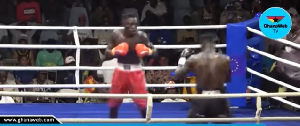- Home - News
- TWI News | TV
- Polls
- Year In Review
- News Archive
- Crime & Punishment
- Politics
- Regional
- Editorial
- Health
- Ghanaians Abroad
- Tabloid
- Africa
- Religion
- Election 2020
- Coronavirus
- News Videos | TV
- Photo Archives
- News Headlines
- Press Release
General News of Monday, 9 February 2004
Source: GNA
High Courts have no jurisdiction in Chieftaincy cases
Sekondi, Feb. 9 GNA- Mr. Justice Robin Batu, a Supervising High Court Judge on Monday said though under the Courts Act of 1993, the High Courts has no jurisdiction over chieftaincy issues, several of the cases had been sent to the courts.
"Chieftaincy related cases smuggled into the High courts are done through applications for "certiorari", "mandamus" and "contempt", but this very serious trend is gradually making the institution irrelevant in the Western region" he stressed.
Justice Batu who was speaking at the opening of the 2004 Criminal Assizes Session at Sekondi said, the coercive powers of the High Court, are gradually being used by rivals in chieftaincy disputes. He urged chiefs to use the Judicial Committees of the various Traditional Councils, Regional and National House of Chiefs, to deal with chieftaincy disputes.
Justice Batu stressed that "in addition, the traditional methods of conflict resolution, arbitration and settlements should be used to resolve differences among chiefs and their elders".
Justice Batu, charged highly educated, knowledgeable and respected chiefs in the Western Region to help reverse the present trend, adding "at the end, it is the chieftaincy institution that stands to loose". He reminded Jurors that they could be fined for failing to attend court or attending late, while the Police, should also work closely with the State Attorneys and ensure that all witnesses were present in court, to ensure a speedy trial.
Mrs Valerie Amartey, a Chief State Attorney said 18 cases had been listed for trial within the six-month's duration of the session. She reminded lawyers who use uncouth language in court especially in cases where defence lawyer is a female to desist from such acts. Ms. Lucy Blay, Western Regional President of the Ghana Bar Association (GBA) expressed regret at the increasing cases of domestic violence and chieftaincy disputes and called on the society to take a closer look at those two institutions.
Ms. Blay said chiefs who are expected to be fair and thoughtful in all their dealings are either being destooled or being forced into exile by their subjects.
"This is not a good practice and if society fails to act quickly, the chieftaincy institution which we all adore, will lose its meaning and impact in the country's socio-economic development.
Ms. Blay expressed regret that out of the 11 cases listed for last year, only five were successfully tried and urged all to do their best to ensure the early completion of the cases selected for this year. Madam Sophia Horner-Sam, Deputy Western Regional Minister said though the Police were doing their best, the Judiciary needs to do a lot more to boost their moral.
"People who have been found guilty by the courts, should be dealt with swiftly and the necessary sanctions or penalties should be imposed on them.
Madam Horner-Sam said the courts should be circumspect in the type of fines and sentences they impose on those who are found guilty so that people would desist from committing the same crimes.
Mr. Justice Clemence J. Honyenuga, the Assizes Judge cautioned jurors and medical officers that, he would not hesitate to prosecute or fine any of them who delayed the work of the court.
He said the automation of the courts was a very good idea and it would ensure the speedy trial of cases when completed in the Western region.










